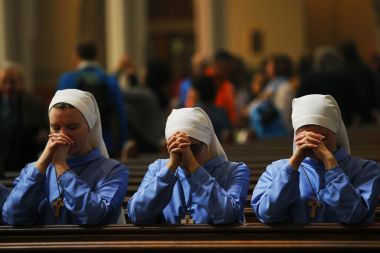Vatican ends controversial investigation of American nuns

The Vatican has ended its controversial crack-down on US nuns two years earlier than expected.
The investigation initiated by Pope Benedict XVI was ended by Pope Francis after the nuns' statutes were amended to place more emphasis on the teachings of Jesus Christ and on being faithful to Catholic doctrines.
The investigation grew out of internal disputes in the worldwide church, especially between the conservative and liberal wings. It focused on concerns over possible feminine interpretations of liturgy and teachings, over interpretation of the reforms of the Second Vatican Council and over the place of women in the church and its leadership.
The inquiry focused on the Leadership Conference of Women Religious, which represents eight in ten of nearly 60,000 US nuns. This group, at the liberal end of the Church spectrum, is known for its faithful dedication to social action, and in this respect is of a like mind to Pope Francis himself.
The Congregation for the Doctrine of the Faith, formerly headed by Cardinal Joseph Ratzinger before be became Pope, even went so far as to take the Conference over, after an initial report accused the nuns of propagating "radical feminist themes incompatible with the Catholic faith." There was also another investigation set up into the nuns' lifestyles.
In its Joint Final Report on the Doctrinal Assessment of the Leadership Conference of Women Religious, published yesterday, the Congregation for the Doctrine of the Faith, said it was agreed that "the role of the Conference as a public juridic person centred on Jesus Christ and faithful to the teachings of the Church is to undertake through its membership and in collaboration with other sisters those services which develop the life and mission of women religious in responding to the Gospel in the contemporary world."
The congregation noted that many people seeking "spiritual growth" were reading publications put out by the sisters.
Because of the vital link between spirituality and theology, publications need "a sound doctrinal foundation," the congregation said. "To this end, measures are being taken to promote a scholarly rigour that will ensure theological accuracy and help avoid statements that are ambiguous with regard to Church doctrine or could be read as contrary to it."
Topics and speakers at events organised by the nuns also had to be arranged "in a prayerful, thoughtful and discerning manner."
The conference said in a statement: "The apostolic visitation gathered a large amount of data both through questionnaires and through the respectful listening that took place on the part of visitation teams as they conducted more than 90 onsite visits to various orders of women religious throughout the United States.
"We are pleased that this data, as well as the experiences, hopes, and dreams shared during the onsite visits, resulted in an accurate report of both the blessings of US women's religious life as well as its challenges. The report, which conveys a good understanding of the transitions that have occurred in religious life since the Second Vatican Council, is offered without negative judgment or any facile solutions. Instead, the synthesis of data resulted in a realistic and appreciative account of women's religious life in the United States."
The statement said the Vatican's decision to conduct an apostolic visitation caused great pain and anxiety for many Catholic sisters but also became the source of "profound transformation".
Cardinal Gerhard Mueller, head of the CDF, said he was now confident the nuns' work was "rooted in the tradition of the Church." He said the sisters were "essential for the flourishing of religious life in the Church."











